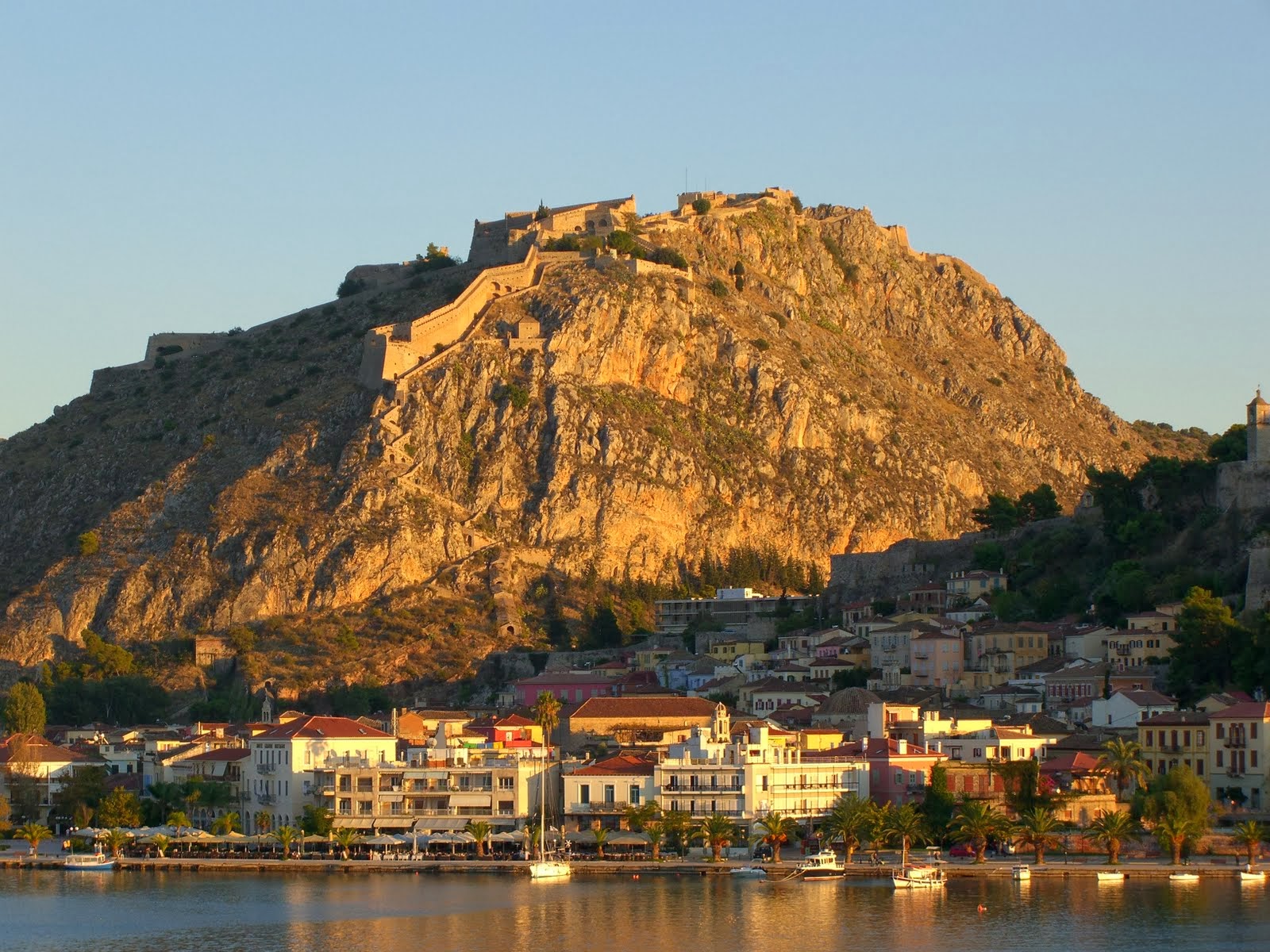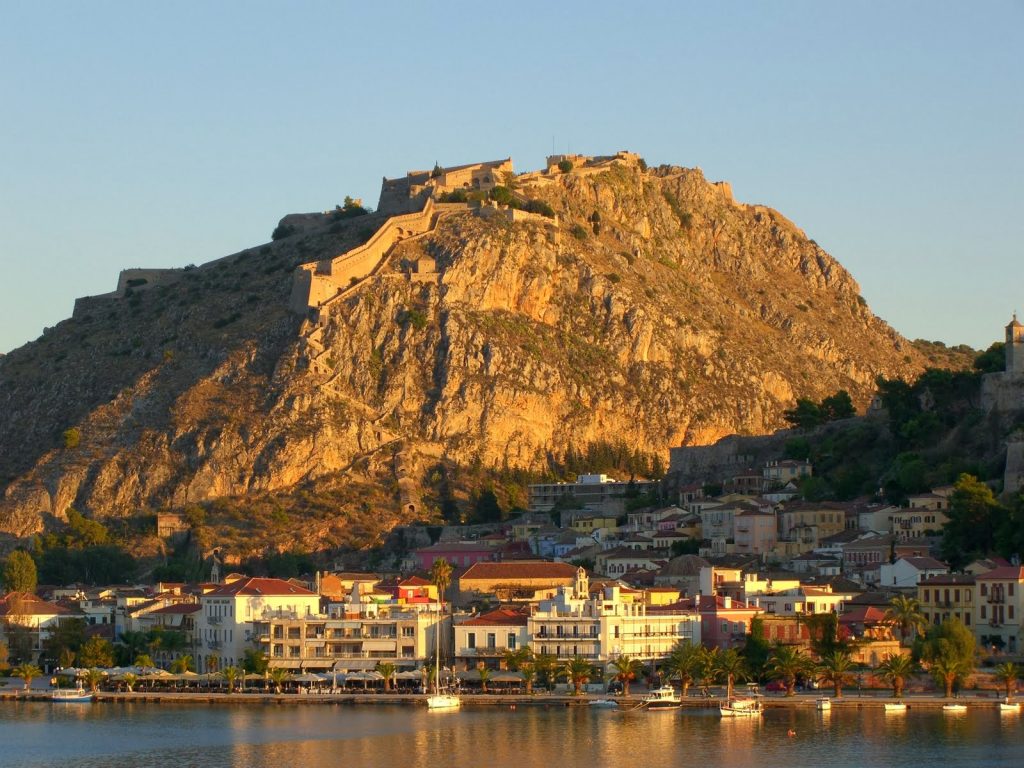European International Studies Association
Olympia Summer Academy
Terrorism & Counterterrorism
Nafplio – Greece
July 9th – 14th 2017
By Steph Moran (Research Fellow)
Throughout 2017, Dartmouth Centre for Seapower and Strategy (DCSS) staff had the privilege of delivering several ‘Future Terrorist Threats’ presentations to a multitude of serving military personnel in the UK and overseas. At 40 Commando Royal Marines base in Taunton, UK, and the Advance Command Staff Course at the Hellenic Military Academy in Greece, much debate was generated by these presentations. This was mostly in the countering terrorism domain in which our targeted audiences were experienced front-line practitioners. These unique events and the recent highly successful DCSS conference on Resurgent Russia at the HMS Excellent acted as the perfect precursor to the European International Studies Association Olympia Summer Academy (Terrorism and Counter Terrorism), which took place in Nafplio in Greece from 9-14 July 2017.
The Olympia Summer Academy (OSA) 2017 delivered six thematic cycles with students expected to attend two cycles each. Due to additional commitments of the DCSS staff, we could only attend the Terrorism and Counterterrorism cycle which turned out to be an extremely captivating, challenging and well run course. Other cycles in the package included: Conflict and Political Violence, Turkey in the 21st Century: Politics, Society & Economy, The History, Philosophy and Sociology of International Relations, Identity Politics and Ethno-Religious Conflicts in the 21st Century, and Political Risk Analysis.
The purpose of this course in its entirety was to review the most recent developments in the field of conflict and political violence including the causes and dynamics of civil war, ethnic conflict, mass violence, genocide, riots, and terrorism; the logic of rebel group formation, cohesion, and performance, and the dynamics of post-conflict violence, peacekeeping, and peace-building. DCSS Research Fellow Stephen Moran was selected to attend from the centre utilising this unique research opportunity to delve into the most recent trends and patterns in the future study of terrorism and counter terrorism; Lectures were delivered by the most contemporary academics in the field of this provocative and pressing field of study. A plethora of pre-reading material was provided in ample time to set the course students up for success. Many of the articles were written by the course faculty themselves and other globally renowned specialists.
The faculty for the 4-day Terrorism and Counterterrorism cycle included:
- Richard English, Pro-Vice-Chancellor of Queen’s University Belfast, where he is also Professor of Politics and Distinguished Professorial Fellow in the George J. Mitchell Institute for Global Peace, Security and Justice.
- Strathis Kayvis, Arnold Wolfers Professor of Political Science, Yale University; Director of Yale’s Program on Order, Conflict, and Violence; author of The Logic of Violence in Civil War.
- Andreas Gofas, Jean Monnet Fellow, Robert Schuman Centre for Advanced Studies. European University Institute; and Assistant Professor of International Relations at Panteion University of Athens and Olympia Summer Academy co-coordinator.
- Harry Papasotiriou, Professor of International Relations at Panteion University and Director of the Institute of International Relations, Athens, Greece.
Professor Richard English is one of the world’s foremost experts on terrorism, with over thirty years’ experience in the field. His most recent book Does Terrorism Work – A History (2016) delivered the majority of the course, along with academy co-director Professor Andreas Gofas acted seamlessly as debate mediator throughout the week. Professor Gofas opened the course with ‘The Study of Terrorism: Successes and Failures’ concentrating on the spike in terrorism studies after the 1972 Munich Olympics attack through to 1991 and the collapse of the Soviet Union, then leading up to 2001 – 9/11 and the Global War on Terror. Prior to 1972, the ‘term terrorism’ was not significantly categorized. Professor Gofas stated that terrorism studies had become a ‘booming’ field which had a zero tolerance for poor research methods and standards, which now stands recognised as a distinctive theme in the field of academic study. This in itself creates issues such as the long drawn out definitional saga of what does terrorism actually mean? However what was pointed out continually by the presenters is that is this really such an important issue or question? It would seem not.
The interpretation that terrorism is a tactic, a violent political tool that uses religion as it’s driver were all discussed. However on summing up the question as to why does terrorism occur, Professor English declared that his own personal and preferred definition is ‘Terrorism is a sub species of war’. He caveated the definition question by literally challenging the students to tackle the definition problem head on – and to ‘create their own’ explanation.
Professor Strathis Kalyvas delivered a stimulating Varieties of Political Violence presentation discussing non-war violence in the shape of contentious actions such as mass street protest, political assassinations, state terror, military coups and ethnic cleansing. The question why interstate wars are in decline provoked a debate with thoughts of globalisation, economy, nationalism and the nuclear deterrent system as factors that have maintained a fragile but steady global state of superpower peace.
Prof Harry Papasotiriou, detailed the early stages and failings of the Global War on Terror. Beginning with the post 1989-Soviet withdrawal from Afghanistan, the rise of jihad to the 1990 Iraq invasion of Kuwait and leading to what he described as ‘the airplanes plan’ and 9/11, which ultimately took us from Taliban to Al Qaeda to ISIS. Mistakes at strategic level were highlighted: for example the USA thought it was entering into a conventional war to overthrow Saddam Hussein and was not prepared for a highly effective counterinsurgency struggle. This catastrophic mistake set the foundations for the modern day Islamist insurgency (ISIS) that is now being played out in UK streets.
Professor English delivered successive presentations on Why Does terrorism Occur? and, Does Terrorism Work? concluding with Why Does Terrorism End? These lectures were delivered with minimal visual aids and maximum theoretical dialogue, along with class participation. Students were introduced to and challenged on the psychology of terrorism and the significance of the historical, ideological and theological aspects behind its causes. Audience participation was constant, keeping both Professors English and Gofas continually on their feet and engaged in captivating verbal sparring with an audience that spanned the globe.
As with many academically intensive and focused seminars that pose such questions, the answers given seemed to create further questions. This ‘wicked problem’ made for a brilliant and challenging learning environment. Numerous terrorist group case studies including ETA, LTTE, PIRA, ANC, PLO and ISIS were discussed as were their successes and failures at the tactical and strategic level. On How Terrorism Ends we discussed the who and why, and assessed considerations such as the use of negotiations, the decapitation of the group, repression, loss of momentum and support, and terrorist group transition leading it to the pathway of ceasefire and peace talks. These themes were defined as why terrorist groups end but also hailed in some cases as reasons for terrorist successes, with the ANC being a prime example of terrorist group failing and succeeding.
The terrorism and countering terrorism course delivered 4 hours of presentations per day over 4 days. Some students felt the distinctive themed topic of terrorism and counterterrorism could easily have become a 2 x 4 day module given the depth of the subject and the deep rooted knowledge of the faculty. For me, it simply was not long enough. The current academic challenges of terrorism studies see the dividing line between the orthodox and the critical; the old problems and new approaches and the future mapping of terrorist studies and the direction they are taking. These are questions which I felt as a practitioner really challenged the students and the end of the course many of them not only wanted to hear the answer but could also provide the answer themselves. Watching four talented PhD students deliver their specific research pathways to academia proved that the search for the answer to these questions may not be too far off.
The OSA is run yearly and applicants should be (post-) graduate students working towards Masters or PhD degrees. It is also opened to advanced undergraduates, as well as to researchers and practitioners. The OSA course staff, administrators and tutors should all be commended and applauded for delivering a complex and administratively challenging course. With over 80 students hailing from South America, USA, Europe and Eastern Europe, to equip students with pre-course reading material, provide travel instructions, accommodation, education and entertainment is no mean feat. Communications and instructions were all seamlessly delivered throughout (Aspa and Nadia delivered time and time again) ensuring all students received one of the most unique, enjoyable and beneficial study experiences academia has to offer.


